The explosions in Greater Kao
hsiung’s Cianjhen (前鎮) and Lingya (苓雅) districts last week have caused at least 1,500 stores to close temporarily as the city government works to rebuild roads and repair structural damage caused by the blasts.
Tsai Chih-liang (蔡志亮), the owner of an electrical appliances store, said he opened for business on Sunday, but that the ruined roads have definitely affected customer numbers.
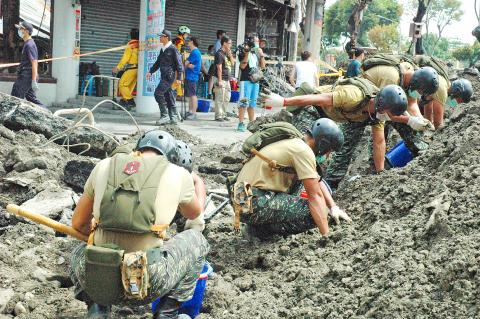
Photo: Fang Chih-hsien, Taipei Times
Tsai said he estimated he would be lucky to make NT$5 million (US$166,600) this year, half of what he usually sees in annual sales, due to the blasts.
Hundreds of businesses on Lizai Road, which was completely ruined, have closed due to a lack of customers.
A scooter repair shop owner surnamed Liu (劉), who has run his business for 30 years, said Yisin Road used to offer many business opportunities due to its large volume of pedestrian traffic, but the explosions have changed that.
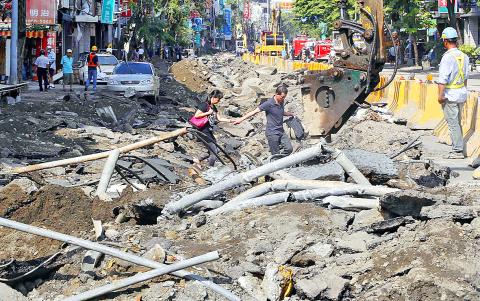
Photo: CNA
“I heard it will take half a year for the roads to be repaved, and while I want to move the business temporarily, there are no good spots,” Liu said.
Wang Mao-pin (王茂彬), the owner of an event decoration store, said that while he can still conduct his business online, he was at a loss as to how to provide supplies as trucks are unable to reach his store, adding that he did not know what his losses might add up to.
Kaisyuan Road, commonly called “car rental street” due to the number of car rental agencies on it, was also severely hit by the blasts, with cars and buildings damaged.
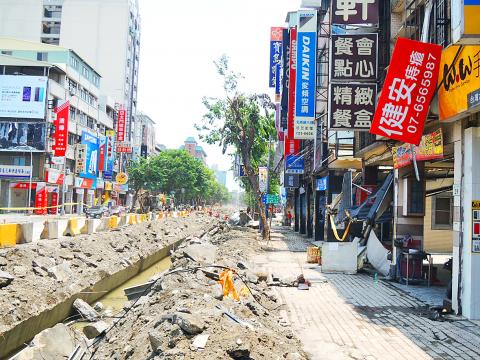
Photo: Ko You-hao, Taipei Times
Some business owners on Kaisyuan Road are already seeking to relocate rather than wait for reconstruction to finish, saying they had to make a living and “couldn’t stand around and starve.”
The Greater Kaohsiung Government said it was preparing to repair 6km of road damaged by the explosions.
Economic Development Bureau Director Tseng Wen-sheng (曾文生) said that 1,275 companies that have registered for compensation related to the disaster so far.
There are easily 1,500 stores that suffered damage from the explosions, but have not registered, Tseng said, adding that the losses the stores have suffered are off the charts.
The city government will reduce taxes for stores affected by the blasts and construct paths to allow access to areas without roading, Tseng said, adding that businesses could also apply for social aid.
Yesterday morning, traffic in Cianjhen District was in gridlock on the first business day after the blasts ripped up several streets in the district on Thursday night and early Friday morning.
The roads were clogged with vehicles as police blocked traffic into the area to allow technicians to check for gas leaks in underground pipelines.
In the Sanduo business center, which is usually packed with shoppers, it was relatively slow yesterday morning.
Meanwhile, soldiers deployed to help with rescue operations continued to dig in the area, searching for people killed in the disaster, while residents tried to deal with the stench of what they believe to be decomposing bodies.
Additional reporting by CNA
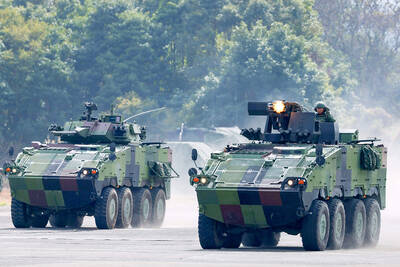
Taiwan must first strengthen its own national defense to deter a potential invasion by China as cross-strait tensions continue to rise, multiple European lawmakers said on Friday. In a media interview in Taipei marking the conclusion of an eight-member European parliamentary delegation’s six-day visit to Taiwan, the lawmakers urged Taipei to remain vigilant and increase defense spending. “All those who claim they want to protect you actually want to conquer you,” Ukrainian lawmaker Serhii Soboliev said when asked what lessons Taiwan could draw from Russia’s invasion of Ukraine. Soboliev described the Kremlin as a “new fascist Nazi regime” that justified
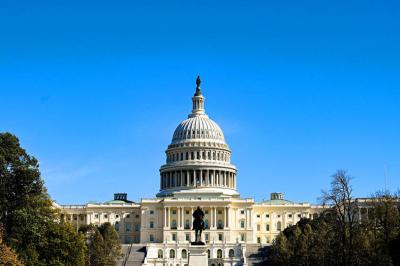
The US House of Representatives yesterday passed the PROTECT Taiwan Act, which stipulates that Washington would exclude China from participating in major global financial organizations if its actions directly threaten Taiwan’s security. The bill, proposed by Republican US Representative Frank Lucas, passed with 395 votes in favor and two against. It stipulates that if China’s actions pose any threat to Taiwan’s security, economic or social systems, the US would, “to the maximum extent practicable,” exclude China from international financial institutions, including the G20, the Bank for International Settlements and the Financial Stability Board. The bill makes it clear that China
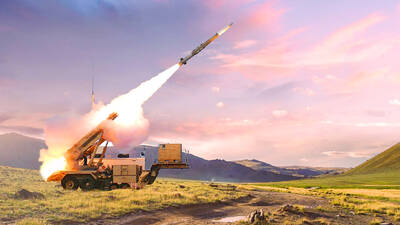
‘T-DOME’: IBCS would increase Taiwan’s defense capabilities, enabling air defense units to use data from any sensor system and cut reaction time, a defense official said A defense official yesterday said that a purported new arms sale the US is assembling for Taiwan likely includes Integrated Battle Command Systems (IBCS). The anonymous official’s comments came hours after the Financial Times (FT) reported that Washington is preparing a US$20 billion arms sale encompassing “Patriot missiles and other weapons,” citing eight sources. The Taiwanese official said the IBCS is an advanced command and control system that would play a key role in President William Lai’s (賴清德) flagship defense program, the “T-Dome,” an integrated air defense network to counter ballistic missiles and other threats. The IBCS would increase Taiwan’s
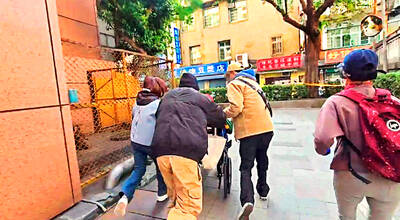
NOMINAL NEWLYWEDS: A man’s family and his wife — his long-term caregiver — are engaged in a legal dogfight over the propriety and validity of the recent union A centenarian’s marriage to his caregiver unbeknownst to his children has prompted legal action, as the caregiver accuses the man’s children of violating her personal liberty and damaging her reputation, while the children have sought a legal option to have the marriage annulled. According to sources, the 102-year-old man surnamed Wang (王) lives in Taipei’s Zhongshan District (中山) and previously worked as a land registration agent. Wang reportedly owns multiple properties and parcels of land worth several hundred million New Taiwan dollars and has ten children. His caregiver, a 69-year-old surnamed Lai (賴), has been caring for him since about 1999,